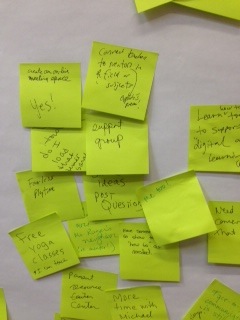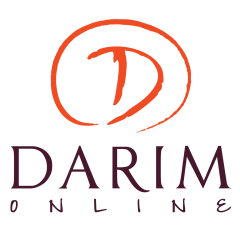To say we do things differently in Portland (Oregon) is a given. Unlike many of the groups participating in Darim's Social Media Boot Camp, Portland Jewish Academy's small but mighty team was made up primarily of teachers. It was therefore not surprising that with our individual classroom needs in mind, we looked for ways that this concept of social media could be used to educate ourselves, our students, or both.
Our journey began in October when we were charged with thinking about the kind of project that would be beneficial for our faculty and the children we teach. PJA is a community day school with a Preschool, Lower School, and Middle School. We have General Studies and Jewish Studies teachers all with differing levels of interest in and comfort with technology. How could we identify a project that would have meaning for all of us? Given that our team included a Lower School General Studies teacher, a Middle School General Studies Teacher, a Middle School Jewish Studies (Hebrew) teacher, our Principal, and our Technology Specialist, we believed it made the most sense for us to focus on the needs and desires of our Kindergarten through 8th Grade program while being sure to address the General and Jewish Studies dual curriculum and the various readiness levels of our staff.
 In keeping with our team's wish to develop a student-centered approach, our initial essential question centered on how we could leverage social media to enhance student learning and engagement across the curriculum. Recognizing that our faculty has just finished our first year of our new technology integration plan and was ripe for additional opportunities for learning, we tweaked our inquiry slightly by asking, "How can professional development support teachers in their integration of social media in classroom instruction?"
In keeping with our team's wish to develop a student-centered approach, our initial essential question centered on how we could leverage social media to enhance student learning and engagement across the curriculum. Recognizing that our faculty has just finished our first year of our new technology integration plan and was ripe for additional opportunities for learning, we tweaked our inquiry slightly by asking, "How can professional development support teachers in their integration of social media in classroom instruction?"
We were delighted to be matched with Boot Camp Coach, Andrea Hernandez, Director of Teaching and Learning at the Martin J. Gottlieb Day School in Jacksonville, Florida. Andrea's school had been successfully using a "Ning" for faculty idea-sharing as well as a blog entitled "21st Century Learning." Seeing these forms of social media being used so effectively as a sharing tool, we considered reframing our question once again. This time we wondered, "How can we use social media to promote sharing and professional development among our teachers?"
"Design Thinking for Educators" became our model for creating a project based on our essential question. Being at its core a method that emphasizes collaboration, optimism, and experimentation, it seemed like the perfect construct for moving our work forward.
Design Thinking begins with a period of DISCOVERY, so with this idea in mind we decided to develop a survey to determine what our teachers want and need when it comes to integrating technology. In our informal conversations with our colleagues about our project, we found that the term "social media" was limiting and sometimes confusing. Thus, our team began to view "social media" as any collaborative, new media tool that supports learning in the digital age.
Teachers were asked to comment on prior professional development experiences as well as their current use of equipment, ease of use, impact on student learning, and technical support and training. Ultimately, 25 faculty members responded to our January 2013 survey.
As part of the INTERPRETATION phase of the Design Thinking for Educators model, we found it most surprising that teachers were less interested in using social media for idea sharing (as we had proposed) but rather wanted to learn about student resources. Our teachers are looking for "how-to" workshops featuring the use of various Web 2.0 tools for learning and the opportunity to share successful digital age teaching practices "face-to-face." They are interested in a wide range of topics and are generally open-minded about trying new things. Not surprisingly, the teachers see time constraints as the number one challenge for participating in this kind of professional development but are willing to do some learning online outside of the regular school day. To paraphrase Field of Dreams, it is clear that if we build a professional development program that focuses on real classroom applications, they will come.
 In April, we honed our essential question once again. This time we asked, "How might we support teachers in professional development on our journey towards digital age teachers and learners." We then participated in the next phase of the process: IDEATION. Using brainstorming rules outlined by Design Thinking for Educators, our Darim Team began to generate a list of ways to go forward with our professional development initiative. We then took this brainstorming process to our Lower School and Middle School faculty knowing that their collective wisdom would help guide our next stage: EXPERIMENTATION.
In April, we honed our essential question once again. This time we asked, "How might we support teachers in professional development on our journey towards digital age teachers and learners." We then participated in the next phase of the process: IDEATION. Using brainstorming rules outlined by Design Thinking for Educators, our Darim Team began to generate a list of ways to go forward with our professional development initiative. We then took this brainstorming process to our Lower School and Middle School faculty knowing that their collective wisdom would help guide our next stage: EXPERIMENTATION.
Within weeks of beginning our Social Media Boot Camp work, our team ultimately did away with the conventional understanding of what social media means to most. We were no longer talking about Facebook or Twitter, Blogs or Wiki Pages, but rather we were widening our lens to include all the potential that learning in the digital age represents. Our project evolved into something quite different from the other participating schools but one that is just right for the needs of Portland Jewish Academy. As we look ahead, we hope to create the kind of training that our faculty desires to make learning in the digital age relevant, engaging, and meaningful to teachers and students alike!
Elana Cohn-Rozansky is a member of the Portland Jewish Academy team that participated in the Social Media Boot Camp for Educators, a year long program generously funded by The Covenant Foundation. This series of blog posts this spring chart the learnings of the 10 teams in this year's cohort.
